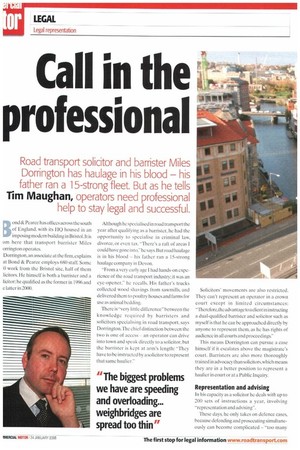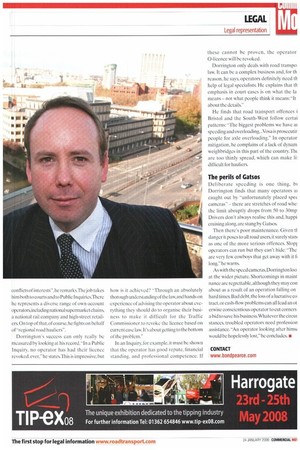Call in the professional
Page 26

Page 27

If you've noticed an error in this article please click here to report it so we can fix it.
Road transport solicitor and barrister Miles Dorrington has haulage in his blood — his father ran a 15-strong fleet. But as he tells Tim Maughan, operators need professional help to stay legal and successful
3 ond 8z Pearce has offices across the south of England, with its 110 housed in an imposing modern building in Bristol. It is rim here that transport barrister Miles orrington operates.
Dorrington, an associate at the firm, explains at Bond & Pearce employs 680 staff. Some 0 work from the Bristol site, half of them licitors. He himself is both a barrister and a licitor; he qualified as the former in 1996 and e latter in 2000. Although he specialised in road transport the year after qualifying as a barrister, he had the opportunity to specialise in criminal law, divorce, or even tax. "There's a raft of areas I could have gone into," he says. But road haulage is in his blood — his father ran a 15-strong haulage company in Devon.
"From a very early age I had hands-on experience of the road transport industry; it was an eye-opener,he recalls. His father's trucks collected wood shavings from sawmills, and delivered them to poultry houses and farms for use as animal bedding.
There is "very little difference" between the knowledge required by barristers and solicitors specialising in road transport, says Dorrington,The chief distinction between the two is one of access — an operator can drive into town and speak directly to a solicitor, but the barrister is kept at arm's length: "They have to be instructed by a solicitor to represent that same haulier." Solicitors' movements are also restricted. They can't represent an operator in a crown court except in limited circumstances: `"l'herefore, the advantage to a client in instructing a dual-qualified barrister and solicitor such as myself is that he can be approached directly by anyone to represent them, as he has rights of audience in all courts and proceedings."
This means Dorrington can pursue a case himself if it escalates above the magistrate's court. Barristers are also more thoroughly trained in advocacy than solicitors,which means they are in a better position to represent a haulier in court or at a Public Inquiry.
Representation and advising In his capacity as a solicitor he deals with up to 200 sets of instructions a year, involving "representation and advising''.
These days, he only takes on defence cases, because defending and prosecuting simultaneously can become complicated — "too many conflicts of interests", he remarks.The job takes him both to courts and to Public Inquiries.There he represents a diverse range of own-account operators,including national supermarket chains, a national rail company and high-street retailers.On top of that, of course, he fights on behalf of "regional road hauliers".
Dorrington's success can only really be measured by looking at his record. "In a Public Inquiry, no operator has had their licence revoked, ever," he states.This is impressive, but how is it achieved? "Through an absolutely thorough understanding of the law, and hands-on experience of advising the operator about everything they should do to organise their business to make it difficult for the Traffic Commissioner to revoke the licence based on current case law. It's about getting to the bottom of the problem."
In an Inquiry, for example. it must be shown that the operator has good repute, financial standing. and professional competence. If these cannot he proven, the operator 0-licence will be revoked.
Dorrington only deals with road transpa law It can be a complex business and, for th reason, he says, operators definitely need th help of legal specialists. He explains that th emphasis in court cases is on what the la. means — not what people think it means: "It about the details."
He finds that road transport offences i Bristol and the South-West follow certai patterns: The biggest problems we have al speeding and overloading...Vosa is prosecutir people for axle overloading." In operator mitigation, he complains of a lack of dynam weighbridges in this part of the country. Thc are too thinly spread, which can make lii difficult for hauliers.
The perils of Gatsos
Deliberate speeding is one thing, In Dorrington finds that many operators ai caught out by "unfortunately placed spec cameras" — there are stretches of road whe! the limit abruptly drops from 50 to 30mp Drivers don't always realise this and, happi cruising along, are stung by Gatsos.
Then there's poor maintenance. Given ti danger it poses to all road users, it surely stani as one of the more serious offences. Slopi operators can run hut they can't hide: -The are very few cowboys that get away with it I; long," he warns.
As with the speed cameras, Dorrington loo. at the wider picture. Shortcomings in maint nance are regrettable, although they may con about as a result of an operation falling on hard times. Bad debt,the loss of a lucrative co tractor cash-flow problems can all lead an ot erwise conscientious operator to cut corners a hid to save his business. Whatever the circut stances, troubled operators need profession assistance. -An operator looking after hims( would be hopelessly lost," he concludes. •








































































































































































